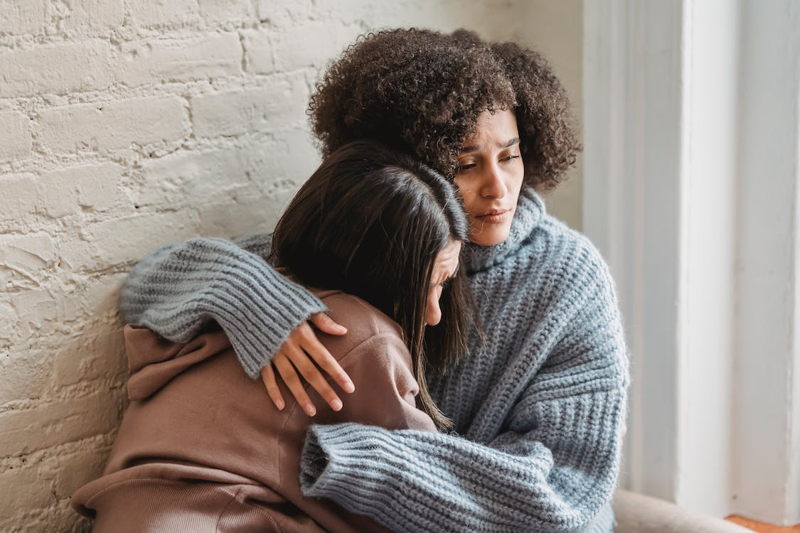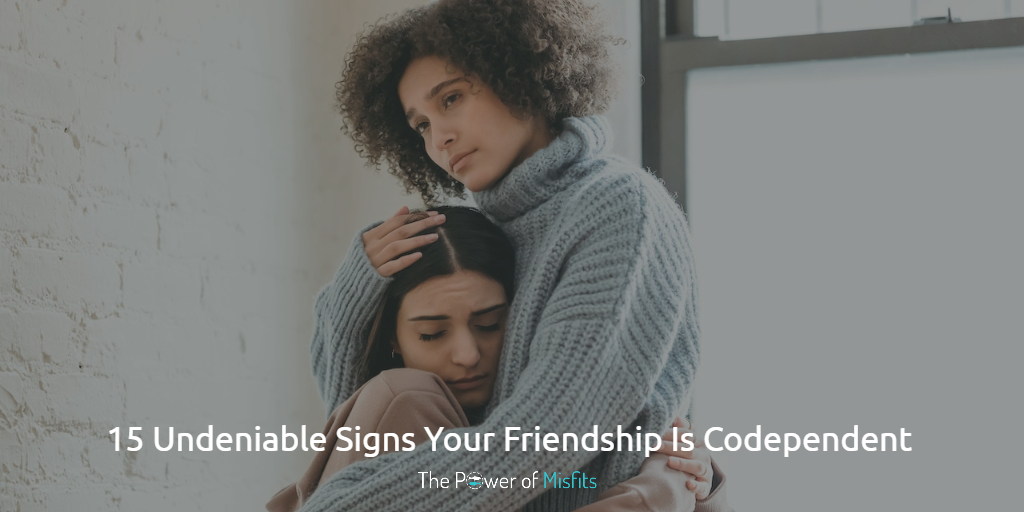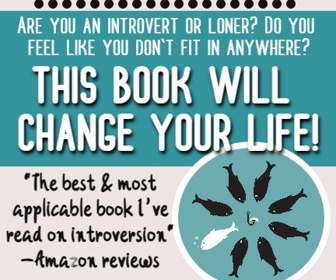Do you have a needy friend who often gets into trouble and you rescue them time after time? Maybe your friend is chronically dealing with some kinds of psychological problems or personal dramas and is always looking for a listening ear and advice?
You could be in a codependent friendship.
Let’s talk about what it means to be in one and how you can recognize the signs of codependency in friendships.
Codependent Friendship Definition
It means an unhealthy friendship where personal boundaries are blurred and the one friend depends on the other emotionally, practically, or even financially.
Typically, one of them plays the role of a ‘taker’ and is always in trouble. They can’t cope with their problems on their own, so they seek support from others. In turn, the ‘giver’ provides them with the assistance and emotional support they need.
15 Undeniable Signs of a Codependent Friendship
1. Your friend is always in need

Your friend seems to be the unluckiest person ever. They always lose their keys, have their wallet stolen, get into bad company, or fall in love with the wrong person.
So, they call you out of the sudden and ask you to come pick them up or give them some money. Alternatively, they are always in need of emotional support. They want to talk over and over again about their heartbreaks and disappointments, and you are there to listen.
This is what true friends do, right? But take a moment to answer this simple question: does your friend do the same for you, too? If they don’t, then most likely, your friendship is codependent.
2. The support is one-sided
This is the key difference between a codependent friendship and a healthy one.
In a healthy bond, both people provide each other with help and support. Just as your friend wants to discuss their personal problems, so do you, and they will sit and listen when you need someone to talk to.
When codependency takes place in friendships, the support is one-sided. Be it practical/financial assistance or emotional help, your friend is always the needy party, and you always play the role of a ‘listening ear’ or a ‘shoulder to cry on’.
3. Your friend relies on you
You are the only close person your friend has and can rely on. Maybe they have a terrible relationship with their parents, so they can’t turn to them for help or even tell them about their problems. Maybe they have no other friends, and all their social connections are too superficial.
So you are basically their only support system. Your friend often tells you that you are their best and most loyal friend and you are the only one who understands and listens.
This may make you feel special and flattered, but the truth is that this reliance is unhealthy and is a huge sign of a codependent friendship.
4. Your friend’s presence can be draining
This neediness of your friend sometimes makes them difficult to be with. You may begin to feel that your friend’s presence is daunting because they always complain and talk about negative things.
In a sense, they drain your energy because most of your conversations revolve around their problems. Even if you used to have fun in the past, it’s no longer there.
You may begin to notice that you are not enthusiastic about meeting up with your friend. You may even feel guilty about that. Friends support each other during hard times, right? So, you need to be there when your friend needs you. But what if your friend is chronically having a hard time?
If your friendship is codependent and one-sided, you will feel like being a parent of a troubled teen. At some point, you get tired of sorting out their mess.
5. You feel obliged to solve your friend’s problems

In a sense, you feel responsible for your friend’s problems. You are used to your role of a rescuer or counselor–your friendship has always been this way. So, you feel obliged to offer your friend a shoulder to cry on when they get into trouble again.
Sometimes this feeling of obligation stems from a mere habit, but it may also come down to guilt. As we said above, most likely, your friend doesn’t have anyone else to talk to or turn to in a moment of crisis. You are the only close person they have, which brings a certain degree of responsibility with it.
Beware of this way of thinking, though. Your friend is an adult, just as you are, and you are not responsible for their life choices.
6. You put your friend’s needs first
You were going to have dinner with your husband, but suddenly, your friend shows up at your door and says her boyfriend dumped her again. So, instead of having a romantic experience with your special someone, you spend the evening listening to your friend and trying to calm her down.
Yes, things happen, and sometimes we have no other choice but to cancel our plans to help someone who needs us. But what if a situation like this is a repeating pattern in your friendship?
Do you step on your neck in order to help your friend? Do you suddenly forget about your plans and responsibilities when your needy friend shows up? Does it often happen that you give up time with your family and other friends in order to be there for your friend?
This is not a healthy bond and is a huge sign of codependency in a friendship.
7. Boundaries are blurred
Since your friend relies on you so much, they think it’s fine to show up unannounced or give you a phone call in the middle of the night.
When it happens, you may feel annoyed at first, but you soon forget about it and switch to your ‘giver’ mode again. You always find a way to excuse their behavior–they need you, they have no one else to turn to, etc.
Weak personal boundaries are a telltale sign of a codependent friendship. The problem is that you allow your friend to repeatedly overstep your boundaries. So, unless one of you breaks the pattern, your friendship will continue to be codependent.
8. Your friend tells you more than you tell them
As we said, codependency in friendships results in the fact that one of the friends plays the role of a listening ear. If this is what you do, you rarely tell your friend about your problems.
You may feel that their life is difficult enough, so they are not the right person to discuss your concerns with. Maybe this thought doesn’t even cross your mind–you are so used to the friendship dynamic where you are a listener that it feels weird to change roles.
It could also be that you’ve tried to tell your friend about your worries, but they proved unable to provide support. Are they a bad listener? Does each conversation end up with discussing their problems? Do you feel like they don’t understand you?
9. You feel guilty

A key sign of a codependent friendship is that you are haunted by unhealthy guilt, which makes you unable to set firm boundaries and say no when your friend needs you.
Each time they get into trouble, you feel as if it’s your responsibility to rescue them. You struggle to say no. Maybe you don’t even think about it–playing the role of a savior has become your second nature. You may even feel guilty when your friend fails or makes a bad decision.
Your friend may be aware of this and may use your guilt to get what they want. They may say that you are the only person they can rely on and there is no one else they trust.
In any case, codependency fueled by guilt is not a healthy friendship dynamic.
10. You worry about your friend
Since your friend has a remarkable ability to get into trouble, you worry about them a lot.
For example, your friend starts a new relationship, and you begin to worry. Will it be happy and healthy or will it end up with a painful breakup, just like the previous ones? What if your friend has met one more manipulator and he will make her unhappy?
A codependent friendship has many similarities with a parent-child relationship, so you sometimes worry about your friend as if they were your kid. You feel like they can’t cope on their own and are unable to make good choices without your guidance.
11. You are in constant contact
The above–guilt and worrying–result in the fact that you keep in touch with your friend all the time. You want to know how they are doing and what’s going on in their life. If you don’t talk to them for a day or two, you begin to feel concerned.
What if something happened to them? What if they got into some serious trouble this time?
In a sense, you feel the need to control your friend and be constantly present in their life. Once again, this stems from the feeling that they can’t cope without you. Sometimes this may even lead you to controlling behavior.
12. You may feel jealous and bitter

When your friend hangs out with someone else, you feel jealous. You are their best friend, so why do they choose someone else’s company over yours? Don’t they have more fun with you?
Jealousy may set in even when your friend is too busy or gets into a relationship and you stop talking every day. You feel unwanted, as if your friend doesn’t need you anymore.
You are so used to being there for them that you may feel bitter when they don’t show up, asking for your help and advice. Suddenly, everything is fine in their life and they are doing great without you.
13. The role of a ‘giver’ makes you feel competent and special
You may ask, why do people stay in codependent friendships if they are so unhealthy and draining? Okay, it’s understandable why the ‘taker’ needs such a friendship, but what about the ‘giver’? What do they gain?
Being a friend of a needy person makes you feel special. You are the only person they rely on and listen to. Your friend turns to you in times of crisis, and it makes you feel needed.
If your friendship is more about listening and giving advice, you may also feel important and competent. You are so smart, your ideas are so wise, and your friend comes to you for advice time after time. This makes you feel good about yourself.
14. You may feel used

Since there is a steady pattern of you helping your friend, at some point, you may begin to feel used. Yes, you still care about your friend and feel obliged to provide them support, but you may start to wonder,
Are they just taking advantage of me? Am I just a friend of convenience to them?
Even if you don’t consciously ask yourself these questions, the vague feeling of being exploited is still lingering at the back of your mind. It’s because your friendship is imbalanced.
You know it perfectly well that your friend is not there for you when it’s your turn to ask for help and emotional support. They are only interested in getting these things for you. Sadly, this is how codependence in friendships works–the support always goes one way.
15. The level of empathy is dangerously high
Codependent friendships often become enmeshed, where you experience your friends’ problems and feelings as your own. When your friend is upset, you begin to feel this way, too. When they are going through a difficult time, you feel concerned and think about them all the time.
Empathy is a crucial part of emotional attachment, but when its level is too high, it makes you neglect your own needs. You relate to your friend’s feelings so deeply that you may even experience compassion fatigue, where you can’t take in any more emotions.
How to Fix a Codependent Friendship?
The good news is that you can overcome codependency in your friendship and turn it into a healthy bond. What you need to do is take small but steady steps toward breaking an unhealthy reliance your friend has on you. You can start by cutting constant contact and giving your friend more freedom to make decisions.
You can tell them which hours you are not to be disturbed and turn off your phone. Just stop being available 24/7 and don’t rush to rescue your friend at their first request! They are not a child! They are the only person who is responsible for what’s going on in their life.
If you make a firm decision to end codependency in your friendship, it will be easier to set boundaries and say no. This is when you will see the truth about your friendship.
If your friend really cares about you, they will respect your boundaries and stop being so needy. If they don’t, they will most likely disappear from your life and find another ‘rescuer’. In this case, genuine friendship was never there and your bond was based on mere convenience. This means that you are better off without it.



